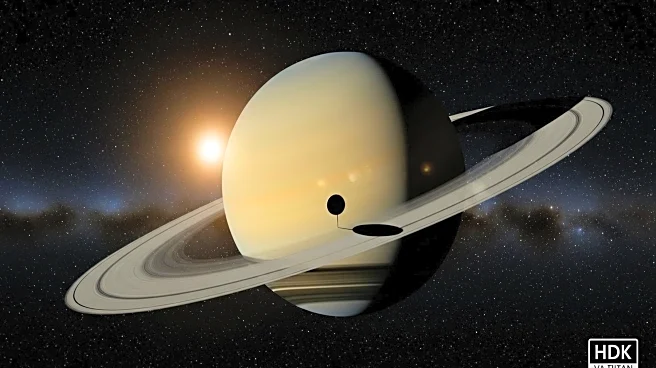What's Happening?
On September 20, 2025, a rare astronomical event will occur as Titan, one of Saturn's moons, transits across the planet's disk, accompanied by its shadow. This event will be visible through telescopes starting at approximately 12:30 A.M. EDT. Titan's crossing begins at 12:33 A.M. EDT, with its shadow appearing shortly after at 12:37 A.M. EDT. The transit will last nearly four hours, concluding with the shadow's departure at 4:04 A.M. EDT and Titan's at 4:37 A.M. EDT. This event is significant as it is the second-to-last shadow transit of Titan visible for more than a decade. Other Saturnian moons, such as Tethys, Rhea, and Dione, will also be observable, although Enceladus' transit may be obscured due to its smaller size and faintness.
Why It's Important?
This astronomical event is significant for both amateur and professional astronomers in the U.S. as it provides a rare opportunity to observe Titan's shadow transit across Saturn. Such events are infrequent, with the next similar occurrence not expected for over a decade. Observing these transits can offer insights into the dynamics of Saturn's moons and their interactions with the planet's rings. For the scientific community, these observations can contribute to a better understanding of the gravitational influences and orbital mechanics within the Saturnian system. For the general public, it presents an opportunity to engage with astronomy and appreciate the complexities of our solar system.
What's Next?
Following this event, astronomers and enthusiasts will have to wait over a decade for the next similar Titan shadow transit. In the meantime, continued observations of Saturn and its moons will persist, focusing on other phenomena such as ring dynamics and atmospheric conditions. The data collected from this transit may be analyzed to refine models of Saturn's gravitational field and the orbital paths of its moons. Public interest in astronomy may be bolstered by such events, potentially leading to increased participation in stargazing activities and educational programs.
Beyond the Headlines
The cultural and educational impact of such astronomical events can be profound, inspiring future generations to pursue careers in science and technology. Events like Titan's shadow transit serve as a reminder of the vastness and complexity of the universe, fostering a sense of curiosity and wonder. They also highlight the importance of preserving dark skies for astronomical observations, which can be threatened by urban light pollution.









